MNG10720 Research: Social Media's Impact on Hotel Occupancy Rate
VerifiedAdded on 2023/03/29
|20
|3031
|394
Report
AI Summary
This research report investigates the impact of social media advertising on hotel room occupancy rates. It employs a descriptive research design with longitudinal elements, utilizing both qualitative and quantitative data collection methods, including in-depth interviews and Qualtrics surveys. The study aims to determine if social media promotion positively influences hotel occupancy, exploring both the positive and negative impacts of social media marketing within the Australian hospitality sector. The research incorporates ethical considerations, sample selection from Facebook pages of selected hotels in Queensland and New South Wales, and data analysis techniques to address the research question. This document is available on Desklib, a platform offering study tools for students.
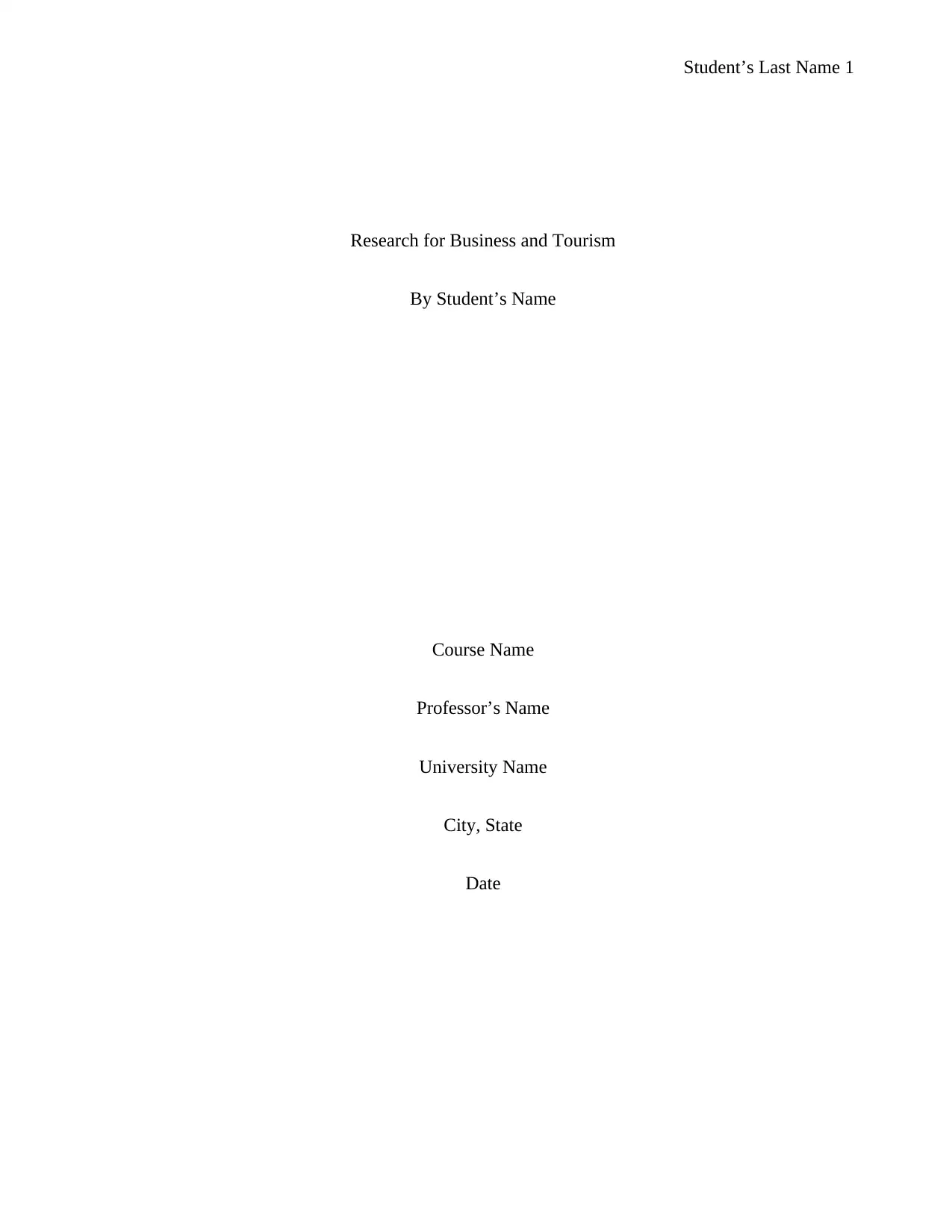
Student’s Last Name 1
Research for Business and Tourism
By Student’s Name
Course Name
Professor’s Name
University Name
City, State
Date
Research for Business and Tourism
By Student’s Name
Course Name
Professor’s Name
University Name
City, State
Date
Paraphrase This Document
Need a fresh take? Get an instant paraphrase of this document with our AI Paraphraser
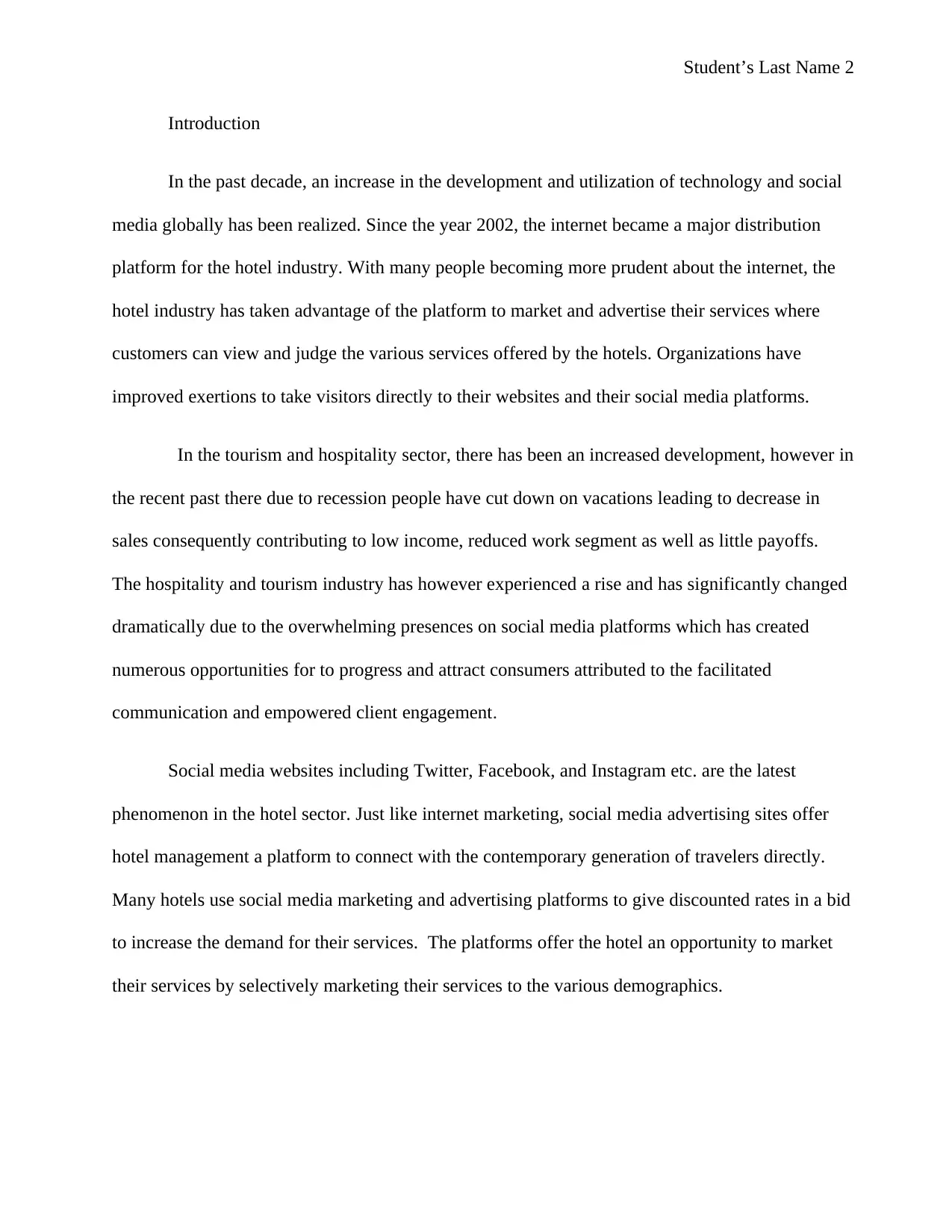
Student’s Last Name 2
Introduction
In the past decade, an increase in the development and utilization of technology and social
media globally has been realized. Since the year 2002, the internet became a major distribution
platform for the hotel industry. With many people becoming more prudent about the internet, the
hotel industry has taken advantage of the platform to market and advertise their services where
customers can view and judge the various services offered by the hotels. Organizations have
improved exertions to take visitors directly to their websites and their social media platforms.
In the tourism and hospitality sector, there has been an increased development, however in
the recent past there due to recession people have cut down on vacations leading to decrease in
sales consequently contributing to low income, reduced work segment as well as little payoffs.
The hospitality and tourism industry has however experienced a rise and has significantly changed
dramatically due to the overwhelming presences on social media platforms which has created
numerous opportunities for to progress and attract consumers attributed to the facilitated
communication and empowered client engagement.
Social media websites including Twitter, Facebook, and Instagram etc. are the latest
phenomenon in the hotel sector. Just like internet marketing, social media advertising sites offer
hotel management a platform to connect with the contemporary generation of travelers directly.
Many hotels use social media marketing and advertising platforms to give discounted rates in a bid
to increase the demand for their services. The platforms offer the hotel an opportunity to market
their services by selectively marketing their services to the various demographics.
Introduction
In the past decade, an increase in the development and utilization of technology and social
media globally has been realized. Since the year 2002, the internet became a major distribution
platform for the hotel industry. With many people becoming more prudent about the internet, the
hotel industry has taken advantage of the platform to market and advertise their services where
customers can view and judge the various services offered by the hotels. Organizations have
improved exertions to take visitors directly to their websites and their social media platforms.
In the tourism and hospitality sector, there has been an increased development, however in
the recent past there due to recession people have cut down on vacations leading to decrease in
sales consequently contributing to low income, reduced work segment as well as little payoffs.
The hospitality and tourism industry has however experienced a rise and has significantly changed
dramatically due to the overwhelming presences on social media platforms which has created
numerous opportunities for to progress and attract consumers attributed to the facilitated
communication and empowered client engagement.
Social media websites including Twitter, Facebook, and Instagram etc. are the latest
phenomenon in the hotel sector. Just like internet marketing, social media advertising sites offer
hotel management a platform to connect with the contemporary generation of travelers directly.
Many hotels use social media marketing and advertising platforms to give discounted rates in a bid
to increase the demand for their services. The platforms offer the hotel an opportunity to market
their services by selectively marketing their services to the various demographics.
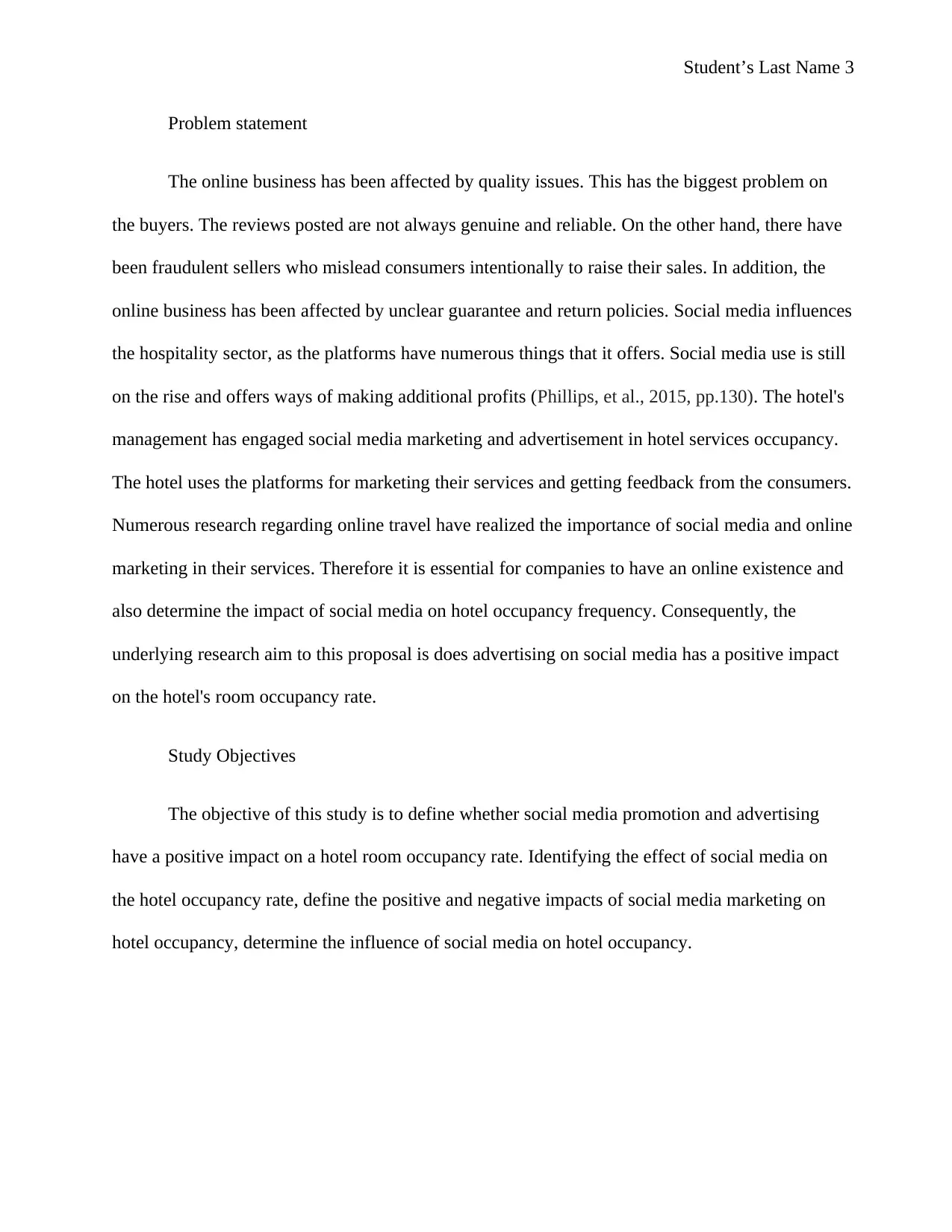
Student’s Last Name 3
Problem statement
The online business has been affected by quality issues. This has the biggest problem on
the buyers. The reviews posted are not always genuine and reliable. On the other hand, there have
been fraudulent sellers who mislead consumers intentionally to raise their sales. In addition, the
online business has been affected by unclear guarantee and return policies. Social media influences
the hospitality sector, as the platforms have numerous things that it offers. Social media use is still
on the rise and offers ways of making additional profits (Phillips, et al., 2015, pp.130). The hotel's
management has engaged social media marketing and advertisement in hotel services occupancy.
The hotel uses the platforms for marketing their services and getting feedback from the consumers.
Numerous research regarding online travel have realized the importance of social media and online
marketing in their services. Therefore it is essential for companies to have an online existence and
also determine the impact of social media on hotel occupancy frequency. Consequently, the
underlying research aim to this proposal is does advertising on social media has a positive impact
on the hotel's room occupancy rate.
Study Objectives
The objective of this study is to define whether social media promotion and advertising
have a positive impact on a hotel room occupancy rate. Identifying the effect of social media on
the hotel occupancy rate, define the positive and negative impacts of social media marketing on
hotel occupancy, determine the influence of social media on hotel occupancy.
Problem statement
The online business has been affected by quality issues. This has the biggest problem on
the buyers. The reviews posted are not always genuine and reliable. On the other hand, there have
been fraudulent sellers who mislead consumers intentionally to raise their sales. In addition, the
online business has been affected by unclear guarantee and return policies. Social media influences
the hospitality sector, as the platforms have numerous things that it offers. Social media use is still
on the rise and offers ways of making additional profits (Phillips, et al., 2015, pp.130). The hotel's
management has engaged social media marketing and advertisement in hotel services occupancy.
The hotel uses the platforms for marketing their services and getting feedback from the consumers.
Numerous research regarding online travel have realized the importance of social media and online
marketing in their services. Therefore it is essential for companies to have an online existence and
also determine the impact of social media on hotel occupancy frequency. Consequently, the
underlying research aim to this proposal is does advertising on social media has a positive impact
on the hotel's room occupancy rate.
Study Objectives
The objective of this study is to define whether social media promotion and advertising
have a positive impact on a hotel room occupancy rate. Identifying the effect of social media on
the hotel occupancy rate, define the positive and negative impacts of social media marketing on
hotel occupancy, determine the influence of social media on hotel occupancy.
⊘ This is a preview!⊘
Do you want full access?
Subscribe today to unlock all pages.

Trusted by 1+ million students worldwide
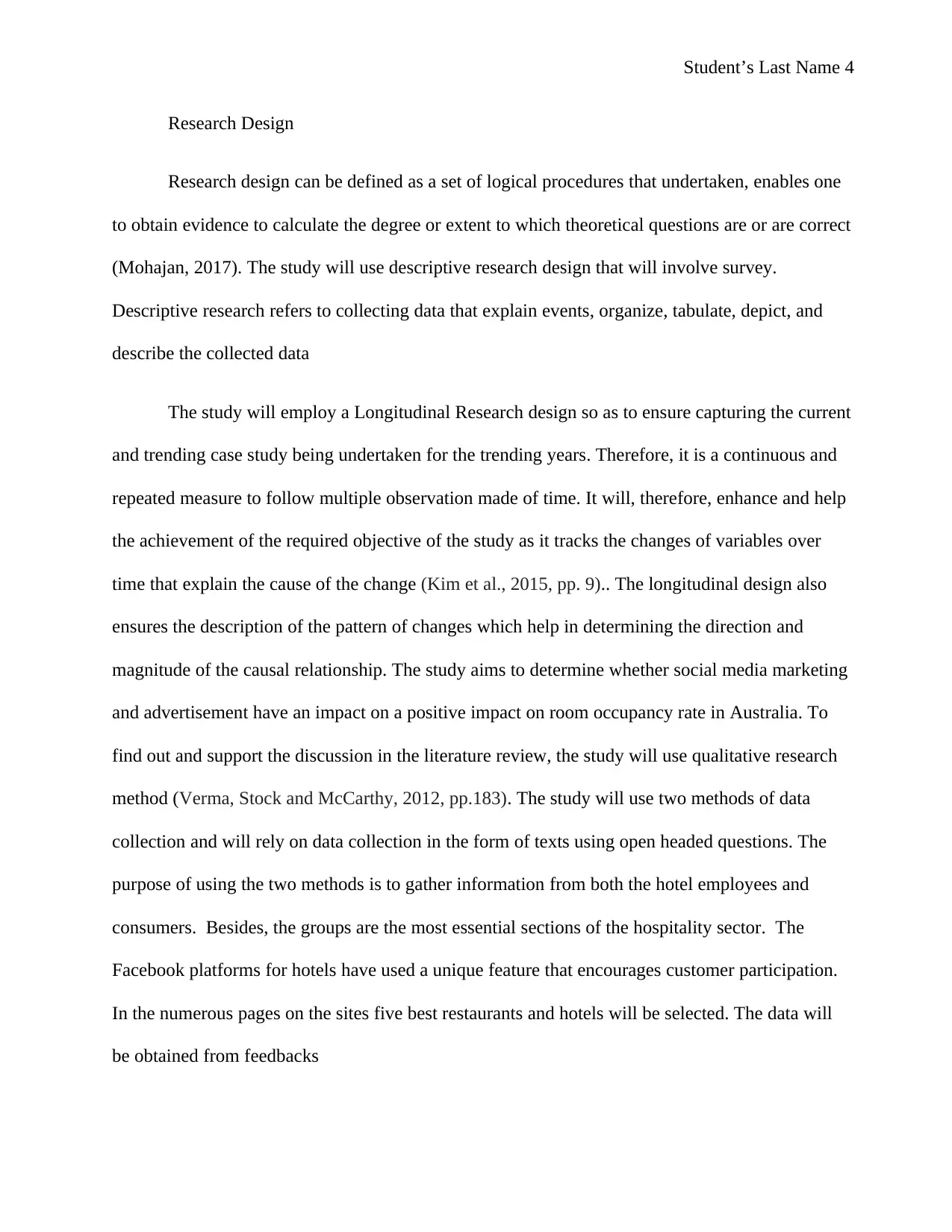
Student’s Last Name 4
Research Design
Research design can be defined as a set of logical procedures that undertaken, enables one
to obtain evidence to calculate the degree or extent to which theoretical questions are or are correct
(Mohajan, 2017). The study will use descriptive research design that will involve survey.
Descriptive research refers to collecting data that explain events, organize, tabulate, depict, and
describe the collected data
The study will employ a Longitudinal Research design so as to ensure capturing the current
and trending case study being undertaken for the trending years. Therefore, it is a continuous and
repeated measure to follow multiple observation made of time. It will, therefore, enhance and help
the achievement of the required objective of the study as it tracks the changes of variables over
time that explain the cause of the change (Kim et al., 2015, pp. 9).. The longitudinal design also
ensures the description of the pattern of changes which help in determining the direction and
magnitude of the causal relationship. The study aims to determine whether social media marketing
and advertisement have an impact on a positive impact on room occupancy rate in Australia. To
find out and support the discussion in the literature review, the study will use qualitative research
method (Verma, Stock and McCarthy, 2012, pp.183). The study will use two methods of data
collection and will rely on data collection in the form of texts using open headed questions. The
purpose of using the two methods is to gather information from both the hotel employees and
consumers. Besides, the groups are the most essential sections of the hospitality sector. The
Facebook platforms for hotels have used a unique feature that encourages customer participation.
In the numerous pages on the sites five best restaurants and hotels will be selected. The data will
be obtained from feedbacks
Research Design
Research design can be defined as a set of logical procedures that undertaken, enables one
to obtain evidence to calculate the degree or extent to which theoretical questions are or are correct
(Mohajan, 2017). The study will use descriptive research design that will involve survey.
Descriptive research refers to collecting data that explain events, organize, tabulate, depict, and
describe the collected data
The study will employ a Longitudinal Research design so as to ensure capturing the current
and trending case study being undertaken for the trending years. Therefore, it is a continuous and
repeated measure to follow multiple observation made of time. It will, therefore, enhance and help
the achievement of the required objective of the study as it tracks the changes of variables over
time that explain the cause of the change (Kim et al., 2015, pp. 9).. The longitudinal design also
ensures the description of the pattern of changes which help in determining the direction and
magnitude of the causal relationship. The study aims to determine whether social media marketing
and advertisement have an impact on a positive impact on room occupancy rate in Australia. To
find out and support the discussion in the literature review, the study will use qualitative research
method (Verma, Stock and McCarthy, 2012, pp.183). The study will use two methods of data
collection and will rely on data collection in the form of texts using open headed questions. The
purpose of using the two methods is to gather information from both the hotel employees and
consumers. Besides, the groups are the most essential sections of the hospitality sector. The
Facebook platforms for hotels have used a unique feature that encourages customer participation.
In the numerous pages on the sites five best restaurants and hotels will be selected. The data will
be obtained from feedbacks
Paraphrase This Document
Need a fresh take? Get an instant paraphrase of this document with our AI Paraphraser
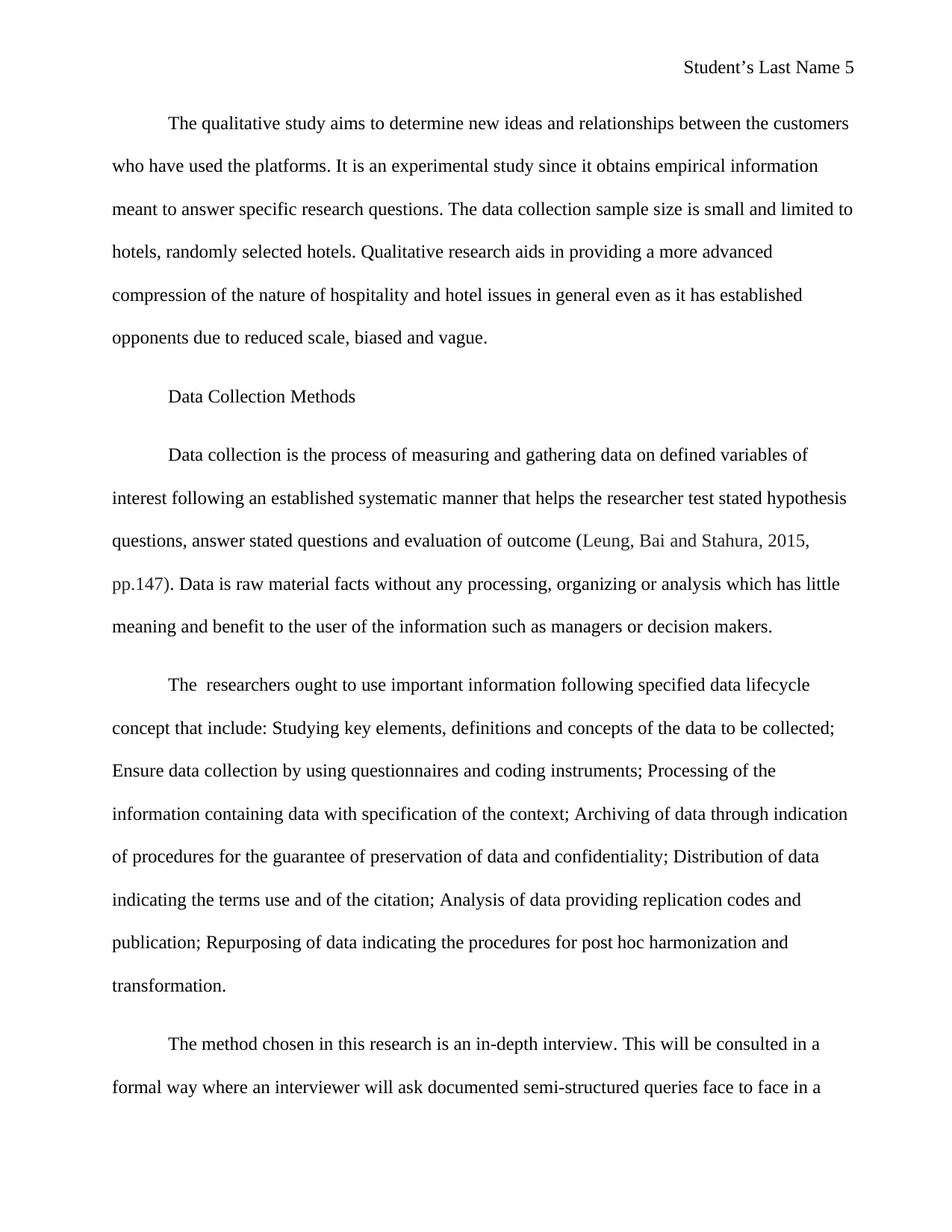
Student’s Last Name 5
The qualitative study aims to determine new ideas and relationships between the customers
who have used the platforms. It is an experimental study since it obtains empirical information
meant to answer specific research questions. The data collection sample size is small and limited to
hotels, randomly selected hotels. Qualitative research aids in providing a more advanced
compression of the nature of hospitality and hotel issues in general even as it has established
opponents due to reduced scale, biased and vague.
Data Collection Methods
Data collection is the process of measuring and gathering data on defined variables of
interest following an established systematic manner that helps the researcher test stated hypothesis
questions, answer stated questions and evaluation of outcome (Leung, Bai and Stahura, 2015,
pp.147). Data is raw material facts without any processing, organizing or analysis which has little
meaning and benefit to the user of the information such as managers or decision makers.
The researchers ought to use important information following specified data lifecycle
concept that include: Studying key elements, definitions and concepts of the data to be collected;
Ensure data collection by using questionnaires and coding instruments; Processing of the
information containing data with specification of the context; Archiving of data through indication
of procedures for the guarantee of preservation of data and confidentiality; Distribution of data
indicating the terms use and of the citation; Analysis of data providing replication codes and
publication; Repurposing of data indicating the procedures for post hoc harmonization and
transformation.
The method chosen in this research is an in-depth interview. This will be consulted in a
formal way where an interviewer will ask documented semi-structured queries face to face in a
The qualitative study aims to determine new ideas and relationships between the customers
who have used the platforms. It is an experimental study since it obtains empirical information
meant to answer specific research questions. The data collection sample size is small and limited to
hotels, randomly selected hotels. Qualitative research aids in providing a more advanced
compression of the nature of hospitality and hotel issues in general even as it has established
opponents due to reduced scale, biased and vague.
Data Collection Methods
Data collection is the process of measuring and gathering data on defined variables of
interest following an established systematic manner that helps the researcher test stated hypothesis
questions, answer stated questions and evaluation of outcome (Leung, Bai and Stahura, 2015,
pp.147). Data is raw material facts without any processing, organizing or analysis which has little
meaning and benefit to the user of the information such as managers or decision makers.
The researchers ought to use important information following specified data lifecycle
concept that include: Studying key elements, definitions and concepts of the data to be collected;
Ensure data collection by using questionnaires and coding instruments; Processing of the
information containing data with specification of the context; Archiving of data through indication
of procedures for the guarantee of preservation of data and confidentiality; Distribution of data
indicating the terms use and of the citation; Analysis of data providing replication codes and
publication; Repurposing of data indicating the procedures for post hoc harmonization and
transformation.
The method chosen in this research is an in-depth interview. This will be consulted in a
formal way where an interviewer will ask documented semi-structured queries face to face in a
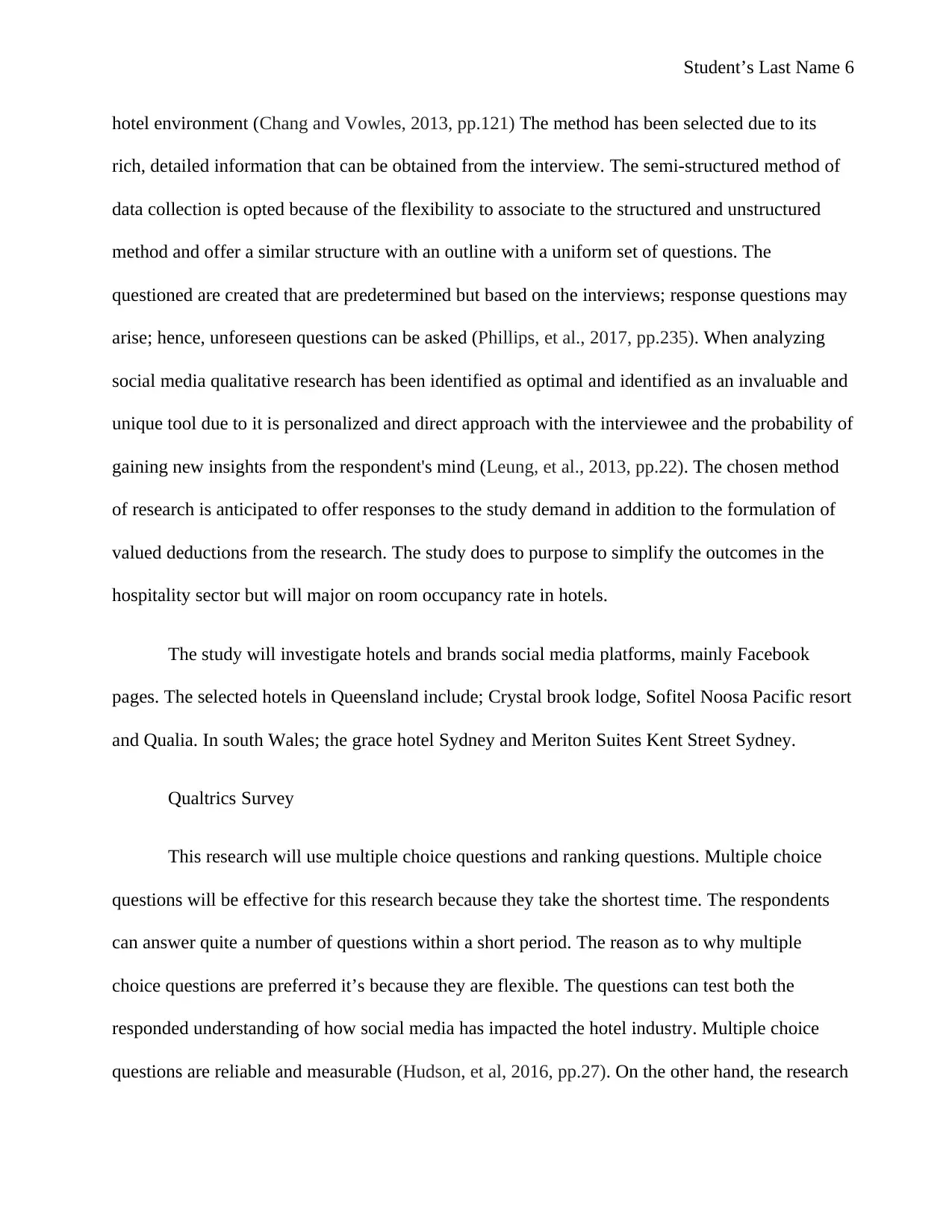
Student’s Last Name 6
hotel environment (Chang and Vowles, 2013, pp.121) The method has been selected due to its
rich, detailed information that can be obtained from the interview. The semi-structured method of
data collection is opted because of the flexibility to associate to the structured and unstructured
method and offer a similar structure with an outline with a uniform set of questions. The
questioned are created that are predetermined but based on the interviews; response questions may
arise; hence, unforeseen questions can be asked (Phillips, et al., 2017, pp.235). When analyzing
social media qualitative research has been identified as optimal and identified as an invaluable and
unique tool due to it is personalized and direct approach with the interviewee and the probability of
gaining new insights from the respondent's mind (Leung, et al., 2013, pp.22). The chosen method
of research is anticipated to offer responses to the study demand in addition to the formulation of
valued deductions from the research. The study does to purpose to simplify the outcomes in the
hospitality sector but will major on room occupancy rate in hotels.
The study will investigate hotels and brands social media platforms, mainly Facebook
pages. The selected hotels in Queensland include; Crystal brook lodge, Sofitel Noosa Pacific resort
and Qualia. In south Wales; the grace hotel Sydney and Meriton Suites Kent Street Sydney.
Qualtrics Survey
This research will use multiple choice questions and ranking questions. Multiple choice
questions will be effective for this research because they take the shortest time. The respondents
can answer quite a number of questions within a short period. The reason as to why multiple
choice questions are preferred it’s because they are flexible. The questions can test both the
responded understanding of how social media has impacted the hotel industry. Multiple choice
questions are reliable and measurable (Hudson, et al, 2016, pp.27). On the other hand, the research
hotel environment (Chang and Vowles, 2013, pp.121) The method has been selected due to its
rich, detailed information that can be obtained from the interview. The semi-structured method of
data collection is opted because of the flexibility to associate to the structured and unstructured
method and offer a similar structure with an outline with a uniform set of questions. The
questioned are created that are predetermined but based on the interviews; response questions may
arise; hence, unforeseen questions can be asked (Phillips, et al., 2017, pp.235). When analyzing
social media qualitative research has been identified as optimal and identified as an invaluable and
unique tool due to it is personalized and direct approach with the interviewee and the probability of
gaining new insights from the respondent's mind (Leung, et al., 2013, pp.22). The chosen method
of research is anticipated to offer responses to the study demand in addition to the formulation of
valued deductions from the research. The study does to purpose to simplify the outcomes in the
hospitality sector but will major on room occupancy rate in hotels.
The study will investigate hotels and brands social media platforms, mainly Facebook
pages. The selected hotels in Queensland include; Crystal brook lodge, Sofitel Noosa Pacific resort
and Qualia. In south Wales; the grace hotel Sydney and Meriton Suites Kent Street Sydney.
Qualtrics Survey
This research will use multiple choice questions and ranking questions. Multiple choice
questions will be effective for this research because they take the shortest time. The respondents
can answer quite a number of questions within a short period. The reason as to why multiple
choice questions are preferred it’s because they are flexible. The questions can test both the
responded understanding of how social media has impacted the hotel industry. Multiple choice
questions are reliable and measurable (Hudson, et al, 2016, pp.27). On the other hand, the research
⊘ This is a preview!⊘
Do you want full access?
Subscribe today to unlock all pages.

Trusted by 1+ million students worldwide
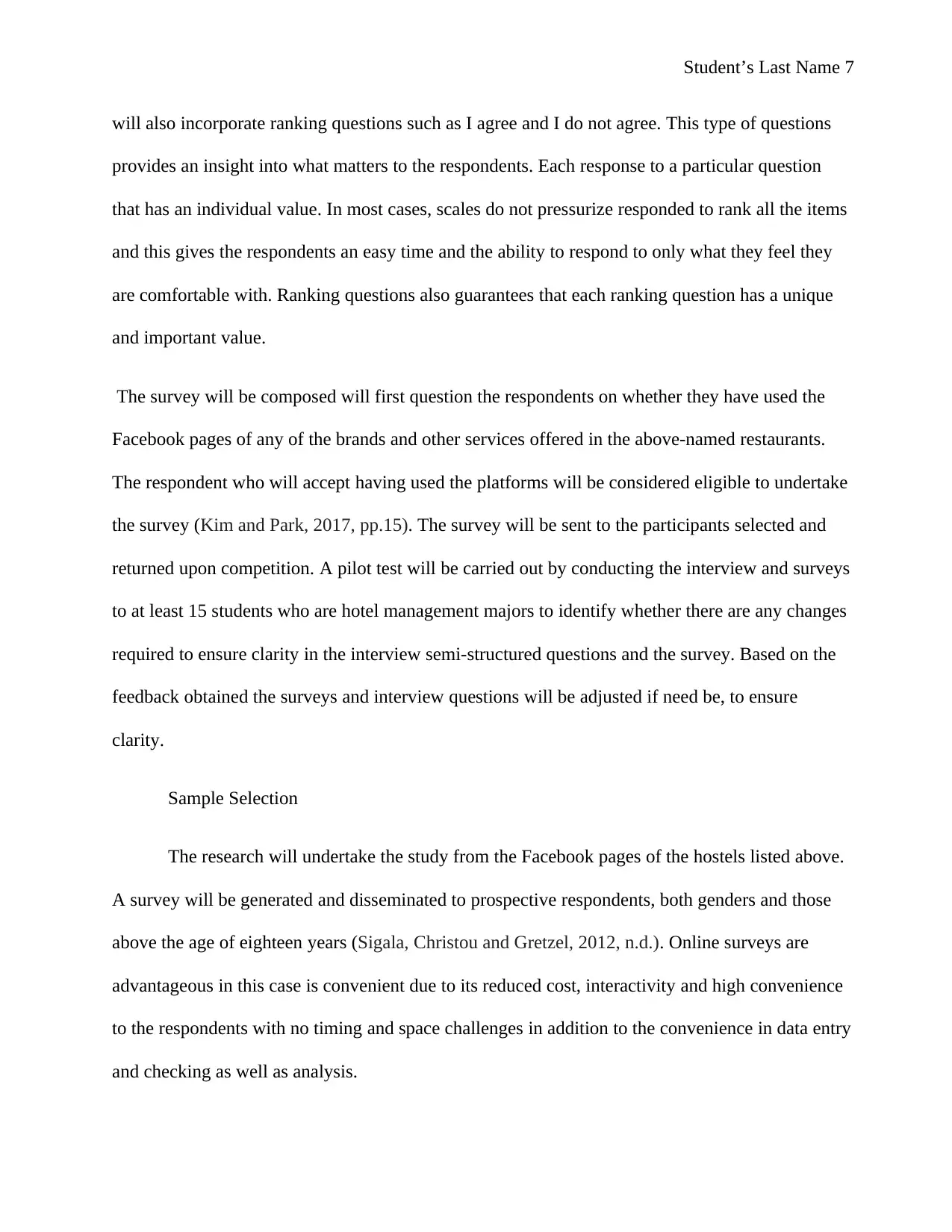
Student’s Last Name 7
will also incorporate ranking questions such as I agree and I do not agree. This type of questions
provides an insight into what matters to the respondents. Each response to a particular question
that has an individual value. In most cases, scales do not pressurize responded to rank all the items
and this gives the respondents an easy time and the ability to respond to only what they feel they
are comfortable with. Ranking questions also guarantees that each ranking question has a unique
and important value.
The survey will be composed will first question the respondents on whether they have used the
Facebook pages of any of the brands and other services offered in the above-named restaurants.
The respondent who will accept having used the platforms will be considered eligible to undertake
the survey (Kim and Park, 2017, pp.15). The survey will be sent to the participants selected and
returned upon competition. A pilot test will be carried out by conducting the interview and surveys
to at least 15 students who are hotel management majors to identify whether there are any changes
required to ensure clarity in the interview semi-structured questions and the survey. Based on the
feedback obtained the surveys and interview questions will be adjusted if need be, to ensure
clarity.
Sample Selection
The research will undertake the study from the Facebook pages of the hostels listed above.
A survey will be generated and disseminated to prospective respondents, both genders and those
above the age of eighteen years (Sigala, Christou and Gretzel, 2012, n.d.). Online surveys are
advantageous in this case is convenient due to its reduced cost, interactivity and high convenience
to the respondents with no timing and space challenges in addition to the convenience in data entry
and checking as well as analysis.
will also incorporate ranking questions such as I agree and I do not agree. This type of questions
provides an insight into what matters to the respondents. Each response to a particular question
that has an individual value. In most cases, scales do not pressurize responded to rank all the items
and this gives the respondents an easy time and the ability to respond to only what they feel they
are comfortable with. Ranking questions also guarantees that each ranking question has a unique
and important value.
The survey will be composed will first question the respondents on whether they have used the
Facebook pages of any of the brands and other services offered in the above-named restaurants.
The respondent who will accept having used the platforms will be considered eligible to undertake
the survey (Kim and Park, 2017, pp.15). The survey will be sent to the participants selected and
returned upon competition. A pilot test will be carried out by conducting the interview and surveys
to at least 15 students who are hotel management majors to identify whether there are any changes
required to ensure clarity in the interview semi-structured questions and the survey. Based on the
feedback obtained the surveys and interview questions will be adjusted if need be, to ensure
clarity.
Sample Selection
The research will undertake the study from the Facebook pages of the hostels listed above.
A survey will be generated and disseminated to prospective respondents, both genders and those
above the age of eighteen years (Sigala, Christou and Gretzel, 2012, n.d.). Online surveys are
advantageous in this case is convenient due to its reduced cost, interactivity and high convenience
to the respondents with no timing and space challenges in addition to the convenience in data entry
and checking as well as analysis.
Paraphrase This Document
Need a fresh take? Get an instant paraphrase of this document with our AI Paraphraser
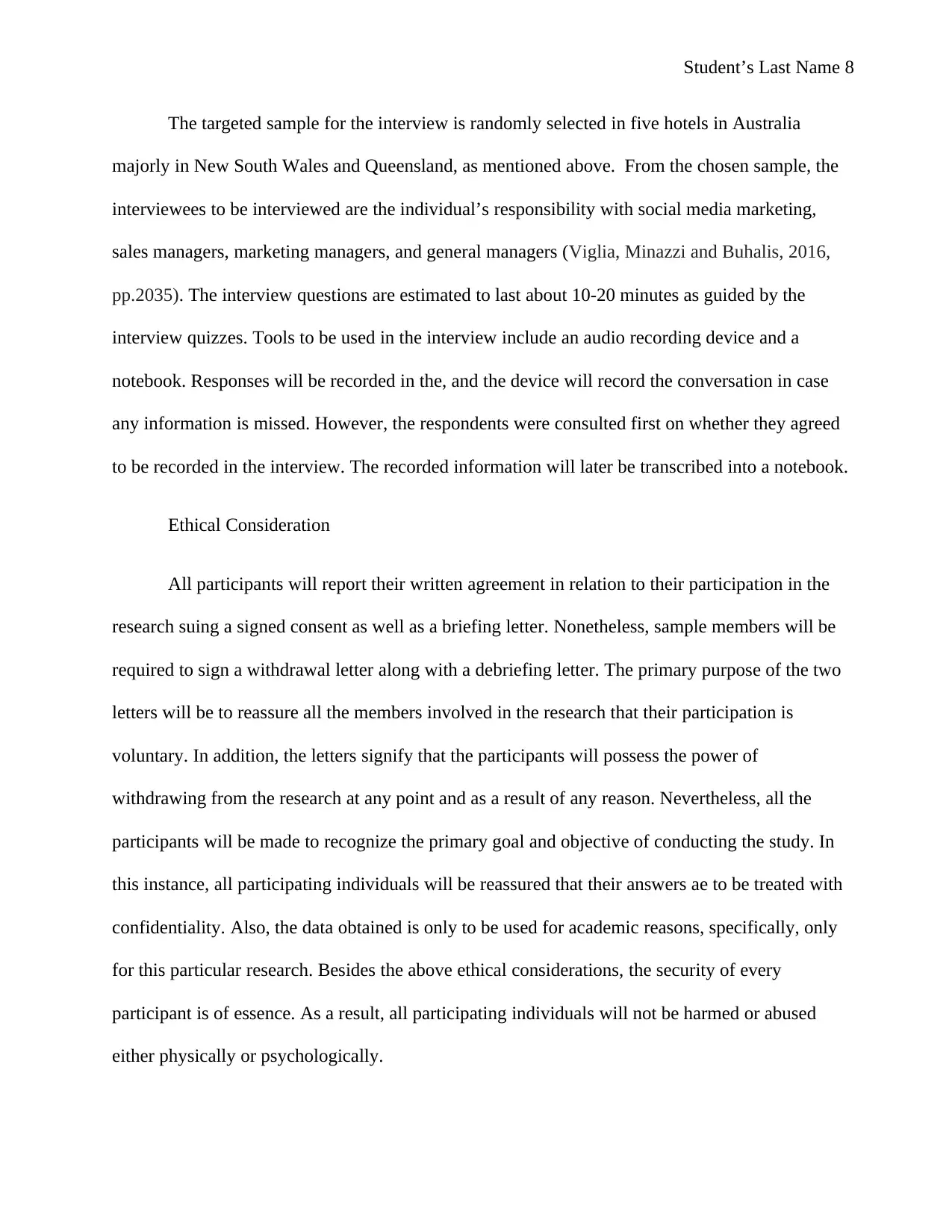
Student’s Last Name 8
The targeted sample for the interview is randomly selected in five hotels in Australia
majorly in New South Wales and Queensland, as mentioned above. From the chosen sample, the
interviewees to be interviewed are the individual’s responsibility with social media marketing,
sales managers, marketing managers, and general managers (Viglia, Minazzi and Buhalis, 2016,
pp.2035). The interview questions are estimated to last about 10-20 minutes as guided by the
interview quizzes. Tools to be used in the interview include an audio recording device and a
notebook. Responses will be recorded in the, and the device will record the conversation in case
any information is missed. However, the respondents were consulted first on whether they agreed
to be recorded in the interview. The recorded information will later be transcribed into a notebook.
Ethical Consideration
All participants will report their written agreement in relation to their participation in the
research suing a signed consent as well as a briefing letter. Nonetheless, sample members will be
required to sign a withdrawal letter along with a debriefing letter. The primary purpose of the two
letters will be to reassure all the members involved in the research that their participation is
voluntary. In addition, the letters signify that the participants will possess the power of
withdrawing from the research at any point and as a result of any reason. Nevertheless, all the
participants will be made to recognize the primary goal and objective of conducting the study. In
this instance, all participating individuals will be reassured that their answers ae to be treated with
confidentiality. Also, the data obtained is only to be used for academic reasons, specifically, only
for this particular research. Besides the above ethical considerations, the security of every
participant is of essence. As a result, all participating individuals will not be harmed or abused
either physically or psychologically.
The targeted sample for the interview is randomly selected in five hotels in Australia
majorly in New South Wales and Queensland, as mentioned above. From the chosen sample, the
interviewees to be interviewed are the individual’s responsibility with social media marketing,
sales managers, marketing managers, and general managers (Viglia, Minazzi and Buhalis, 2016,
pp.2035). The interview questions are estimated to last about 10-20 minutes as guided by the
interview quizzes. Tools to be used in the interview include an audio recording device and a
notebook. Responses will be recorded in the, and the device will record the conversation in case
any information is missed. However, the respondents were consulted first on whether they agreed
to be recorded in the interview. The recorded information will later be transcribed into a notebook.
Ethical Consideration
All participants will report their written agreement in relation to their participation in the
research suing a signed consent as well as a briefing letter. Nonetheless, sample members will be
required to sign a withdrawal letter along with a debriefing letter. The primary purpose of the two
letters will be to reassure all the members involved in the research that their participation is
voluntary. In addition, the letters signify that the participants will possess the power of
withdrawing from the research at any point and as a result of any reason. Nevertheless, all the
participants will be made to recognize the primary goal and objective of conducting the study. In
this instance, all participating individuals will be reassured that their answers ae to be treated with
confidentiality. Also, the data obtained is only to be used for academic reasons, specifically, only
for this particular research. Besides the above ethical considerations, the security of every
participant is of essence. As a result, all participating individuals will not be harmed or abused
either physically or psychologically.
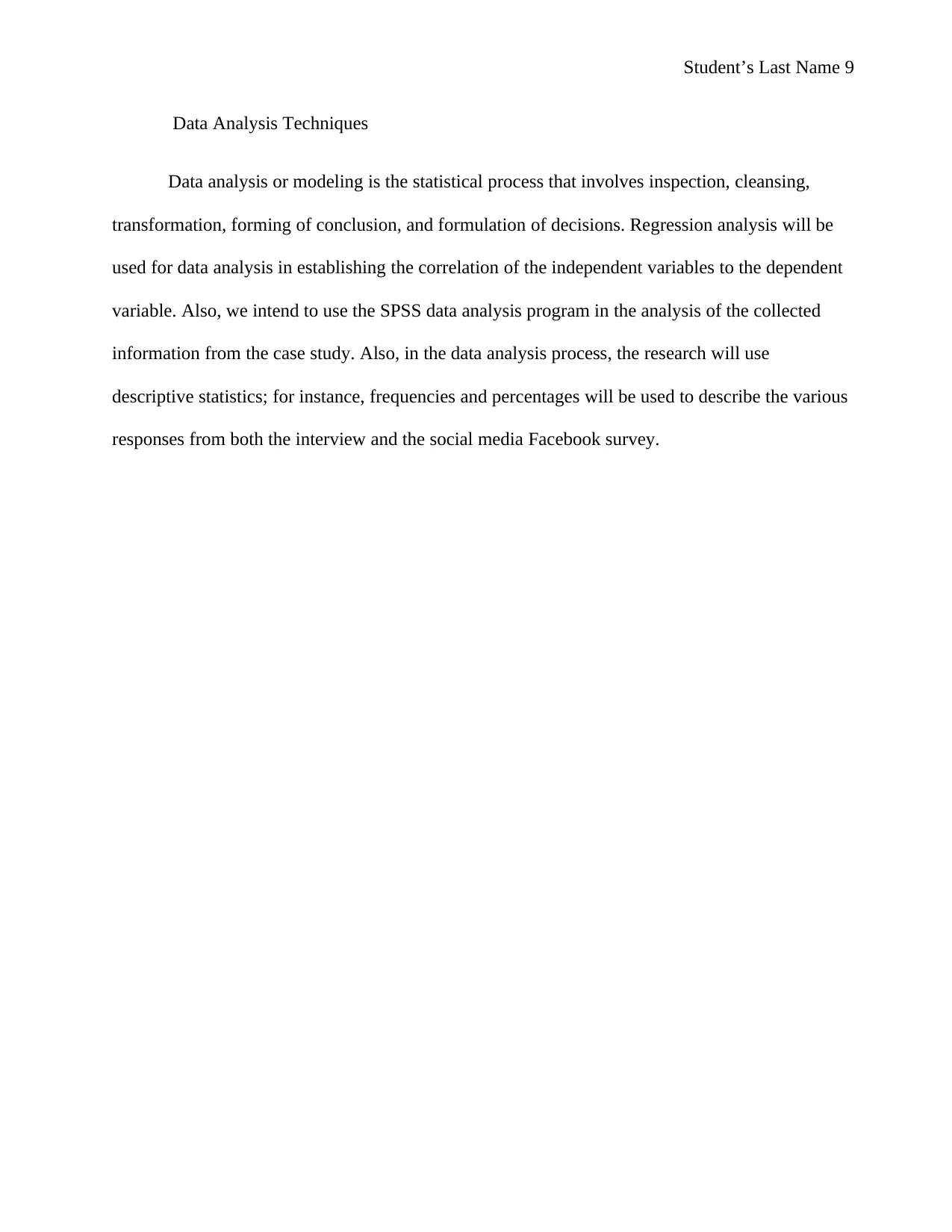
Student’s Last Name 9
Data Analysis Techniques
Data analysis or modeling is the statistical process that involves inspection, cleansing,
transformation, forming of conclusion, and formulation of decisions. Regression analysis will be
used for data analysis in establishing the correlation of the independent variables to the dependent
variable. Also, we intend to use the SPSS data analysis program in the analysis of the collected
information from the case study. Also, in the data analysis process, the research will use
descriptive statistics; for instance, frequencies and percentages will be used to describe the various
responses from both the interview and the social media Facebook survey.
Data Analysis Techniques
Data analysis or modeling is the statistical process that involves inspection, cleansing,
transformation, forming of conclusion, and formulation of decisions. Regression analysis will be
used for data analysis in establishing the correlation of the independent variables to the dependent
variable. Also, we intend to use the SPSS data analysis program in the analysis of the collected
information from the case study. Also, in the data analysis process, the research will use
descriptive statistics; for instance, frequencies and percentages will be used to describe the various
responses from both the interview and the social media Facebook survey.
⊘ This is a preview!⊘
Do you want full access?
Subscribe today to unlock all pages.

Trusted by 1+ million students worldwide
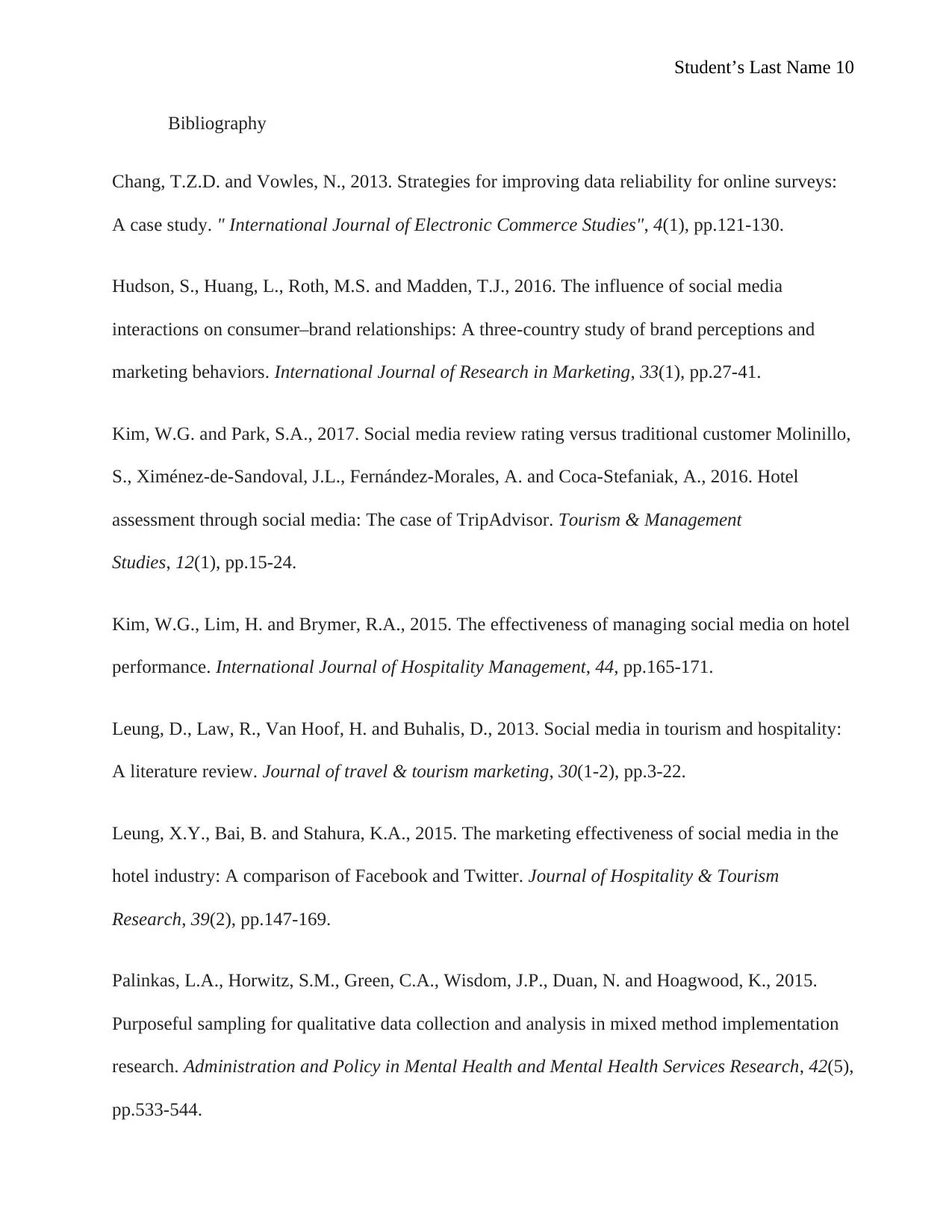
Student’s Last Name 10
Bibliography
Chang, T.Z.D. and Vowles, N., 2013. Strategies for improving data reliability for online surveys:
A case study. " International Journal of Electronic Commerce Studies", 4(1), pp.121-130.
Hudson, S., Huang, L., Roth, M.S. and Madden, T.J., 2016. The influence of social media
interactions on consumer–brand relationships: A three-country study of brand perceptions and
marketing behaviors. International Journal of Research in Marketing, 33(1), pp.27-41.
Kim, W.G. and Park, S.A., 2017. Social media review rating versus traditional customer Molinillo,
S., Ximénez-de-Sandoval, J.L., Fernández-Morales, A. and Coca-Stefaniak, A., 2016. Hotel
assessment through social media: The case of TripAdvisor. Tourism & Management
Studies, 12(1), pp.15-24.
Kim, W.G., Lim, H. and Brymer, R.A., 2015. The effectiveness of managing social media on hotel
performance. International Journal of Hospitality Management, 44, pp.165-171.
Leung, D., Law, R., Van Hoof, H. and Buhalis, D., 2013. Social media in tourism and hospitality:
A literature review. Journal of travel & tourism marketing, 30(1-2), pp.3-22.
Leung, X.Y., Bai, B. and Stahura, K.A., 2015. The marketing effectiveness of social media in the
hotel industry: A comparison of Facebook and Twitter. Journal of Hospitality & Tourism
Research, 39(2), pp.147-169.
Palinkas, L.A., Horwitz, S.M., Green, C.A., Wisdom, J.P., Duan, N. and Hoagwood, K., 2015.
Purposeful sampling for qualitative data collection and analysis in mixed method implementation
research. Administration and Policy in Mental Health and Mental Health Services Research, 42(5),
pp.533-544.
Bibliography
Chang, T.Z.D. and Vowles, N., 2013. Strategies for improving data reliability for online surveys:
A case study. " International Journal of Electronic Commerce Studies", 4(1), pp.121-130.
Hudson, S., Huang, L., Roth, M.S. and Madden, T.J., 2016. The influence of social media
interactions on consumer–brand relationships: A three-country study of brand perceptions and
marketing behaviors. International Journal of Research in Marketing, 33(1), pp.27-41.
Kim, W.G. and Park, S.A., 2017. Social media review rating versus traditional customer Molinillo,
S., Ximénez-de-Sandoval, J.L., Fernández-Morales, A. and Coca-Stefaniak, A., 2016. Hotel
assessment through social media: The case of TripAdvisor. Tourism & Management
Studies, 12(1), pp.15-24.
Kim, W.G., Lim, H. and Brymer, R.A., 2015. The effectiveness of managing social media on hotel
performance. International Journal of Hospitality Management, 44, pp.165-171.
Leung, D., Law, R., Van Hoof, H. and Buhalis, D., 2013. Social media in tourism and hospitality:
A literature review. Journal of travel & tourism marketing, 30(1-2), pp.3-22.
Leung, X.Y., Bai, B. and Stahura, K.A., 2015. The marketing effectiveness of social media in the
hotel industry: A comparison of Facebook and Twitter. Journal of Hospitality & Tourism
Research, 39(2), pp.147-169.
Palinkas, L.A., Horwitz, S.M., Green, C.A., Wisdom, J.P., Duan, N. and Hoagwood, K., 2015.
Purposeful sampling for qualitative data collection and analysis in mixed method implementation
research. Administration and Policy in Mental Health and Mental Health Services Research, 42(5),
pp.533-544.
Paraphrase This Document
Need a fresh take? Get an instant paraphrase of this document with our AI Paraphraser
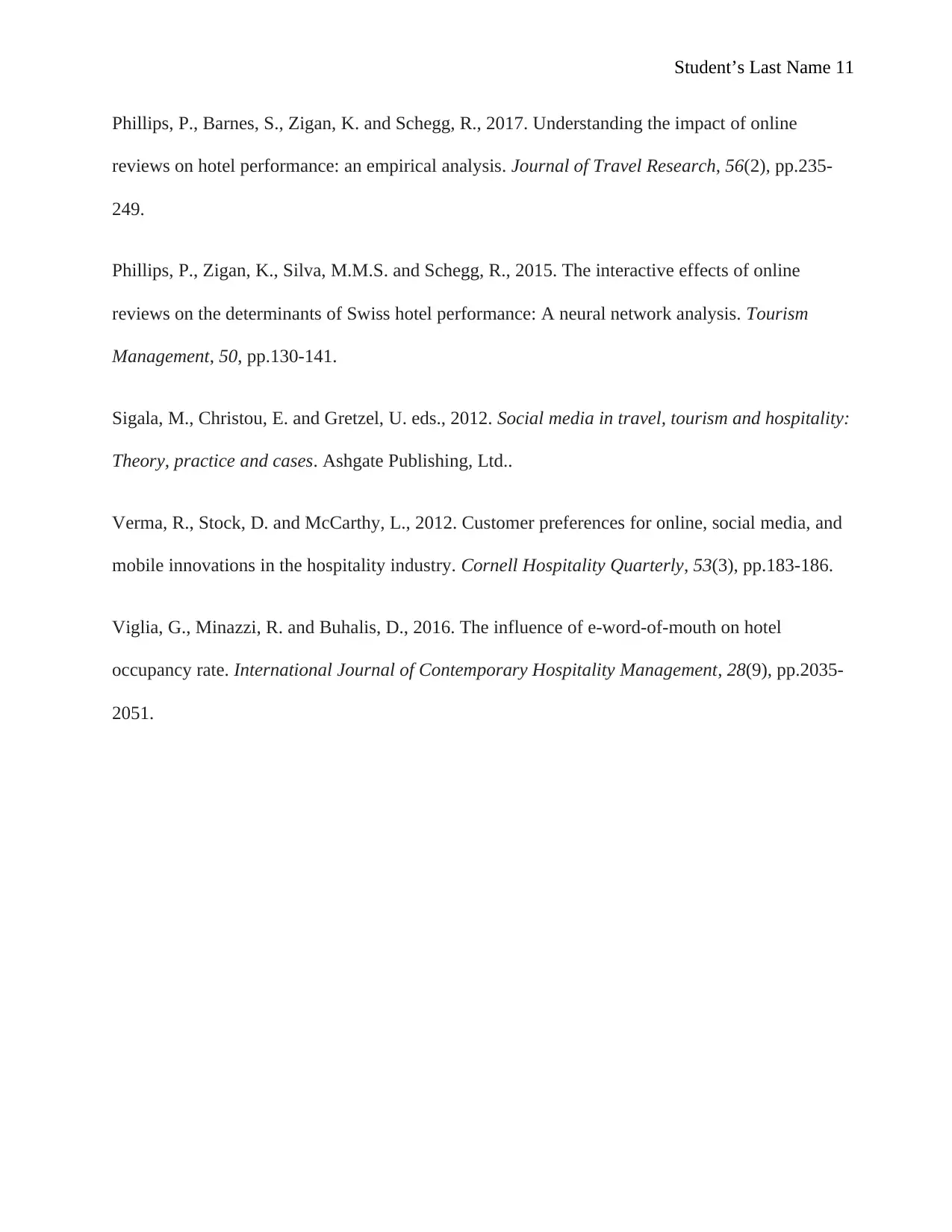
Student’s Last Name 11
Phillips, P., Barnes, S., Zigan, K. and Schegg, R., 2017. Understanding the impact of online
reviews on hotel performance: an empirical analysis. Journal of Travel Research, 56(2), pp.235-
249.
Phillips, P., Zigan, K., Silva, M.M.S. and Schegg, R., 2015. The interactive effects of online
reviews on the determinants of Swiss hotel performance: A neural network analysis. Tourism
Management, 50, pp.130-141.
Sigala, M., Christou, E. and Gretzel, U. eds., 2012. Social media in travel, tourism and hospitality:
Theory, practice and cases. Ashgate Publishing, Ltd..
Verma, R., Stock, D. and McCarthy, L., 2012. Customer preferences for online, social media, and
mobile innovations in the hospitality industry. Cornell Hospitality Quarterly, 53(3), pp.183-186.
Viglia, G., Minazzi, R. and Buhalis, D., 2016. The influence of e-word-of-mouth on hotel
occupancy rate. International Journal of Contemporary Hospitality Management, 28(9), pp.2035-
2051.
Phillips, P., Barnes, S., Zigan, K. and Schegg, R., 2017. Understanding the impact of online
reviews on hotel performance: an empirical analysis. Journal of Travel Research, 56(2), pp.235-
249.
Phillips, P., Zigan, K., Silva, M.M.S. and Schegg, R., 2015. The interactive effects of online
reviews on the determinants of Swiss hotel performance: A neural network analysis. Tourism
Management, 50, pp.130-141.
Sigala, M., Christou, E. and Gretzel, U. eds., 2012. Social media in travel, tourism and hospitality:
Theory, practice and cases. Ashgate Publishing, Ltd..
Verma, R., Stock, D. and McCarthy, L., 2012. Customer preferences for online, social media, and
mobile innovations in the hospitality industry. Cornell Hospitality Quarterly, 53(3), pp.183-186.
Viglia, G., Minazzi, R. and Buhalis, D., 2016. The influence of e-word-of-mouth on hotel
occupancy rate. International Journal of Contemporary Hospitality Management, 28(9), pp.2035-
2051.
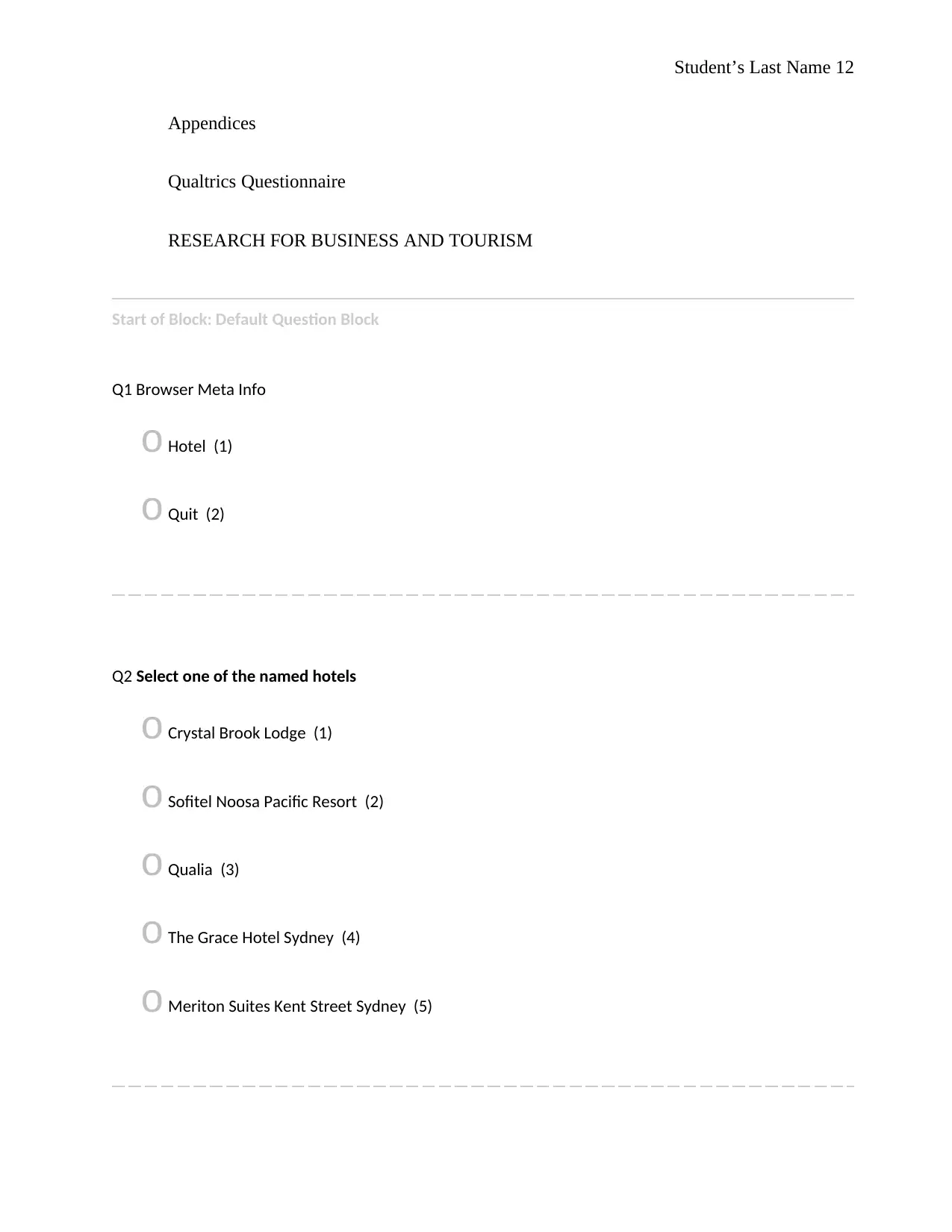
Student’s Last Name 12
Appendices
Qualtrics Questionnaire
RESEARCH FOR BUSINESS AND TOURISM
Start of Block: Default Question Block
Q1 Browser Meta Info
oHotel (1)
oQuit (2)
Q2 Select one of the named hotels
oCrystal Brook Lodge (1)
oSofitel Noosa Pacific Resort (2)
oQualia (3)
oThe Grace Hotel Sydney (4)
oMeriton Suites Kent Street Sydney (5)
Appendices
Qualtrics Questionnaire
RESEARCH FOR BUSINESS AND TOURISM
Start of Block: Default Question Block
Q1 Browser Meta Info
oHotel (1)
oQuit (2)
Q2 Select one of the named hotels
oCrystal Brook Lodge (1)
oSofitel Noosa Pacific Resort (2)
oQualia (3)
oThe Grace Hotel Sydney (4)
oMeriton Suites Kent Street Sydney (5)
⊘ This is a preview!⊘
Do you want full access?
Subscribe today to unlock all pages.

Trusted by 1+ million students worldwide
1 out of 20
Related Documents
Your All-in-One AI-Powered Toolkit for Academic Success.
+13062052269
info@desklib.com
Available 24*7 on WhatsApp / Email
![[object Object]](/_next/static/media/star-bottom.7253800d.svg)
Unlock your academic potential
Copyright © 2020–2025 A2Z Services. All Rights Reserved. Developed and managed by ZUCOL.





